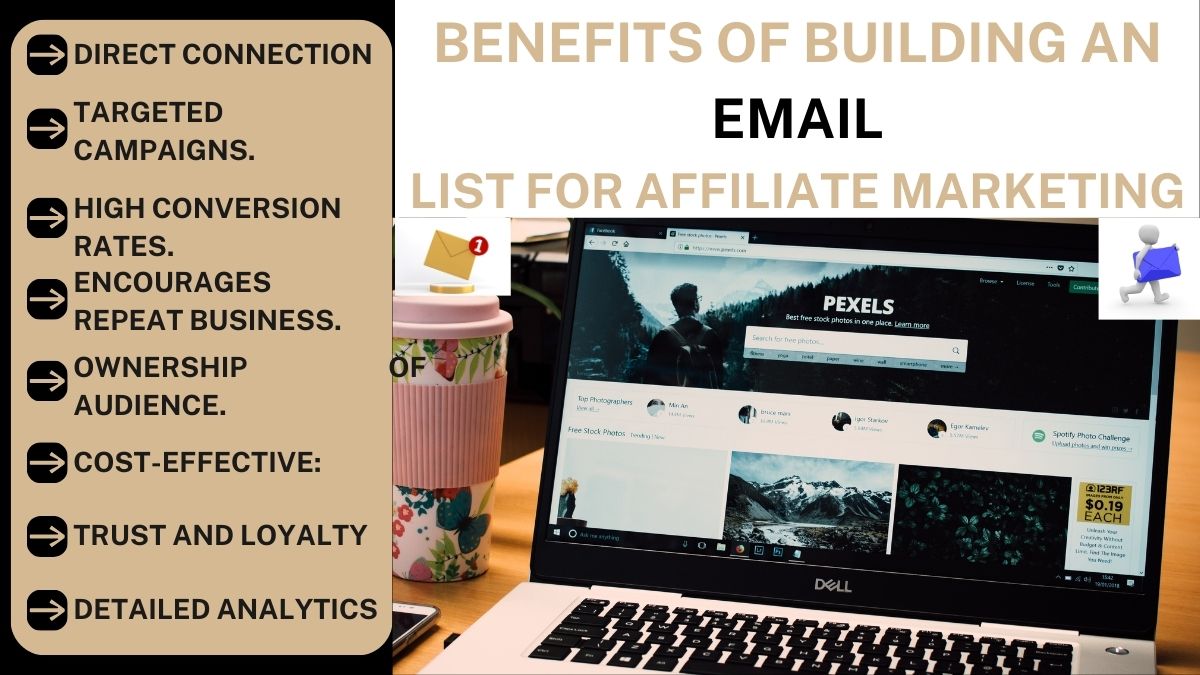Today, I will discuss The Benefits of building an email list for affiliate marketing and why it is a game-changer.
Affiliate marketing is a bustling arena where individuals and companies earn a commission by promoting products or services provided by another retailer or advertiser.
It’s a lucrative opportunity intertwined with the complex digital economy we navigate.
Now, why bring email into this equation? This isn’t just about reaching out to people; it’s also about creating a dedicated channel for direct communication that differs significantly from the noise of social media and online advertising.
Email marketing offers a unique advantage by establishing a direct line to your audience’s inbox, which often translates to higher engagement and conversion rates.
When you consider the synergy between affiliate marketing and email lists, it’s like fitting together two pieces of a puzzle. The process becomes more targeted, personalized, and efficient.
And this is precisely what I’m here to help you with – understanding how a well-built email list can amplify your affiliate marketing efforts and drive actual results.
Adopting a user-first approach by organically building your email list sets the stage for genuine engagement. It ensures that your promotional efforts are welcomed and that your audience is more receptive to the products or services you advocate.
So, as we embark on the significant benefits of building an email list for affiliate marketing, remember that this is crucial for developing a stable and profitable affiliate strategy.
The Power Of Personalization In Email Marketing

You’ve probably heard that email marketing can be compelling for affiliate marketers. But blasting generic emails to everyone on your list will not cut it.
The magic word here is personalization. Why? Personalization translates to relevance, and relevance drives sales.
I will walk you through how impactful understanding and segmenting your audience can be.
By categorizing subscribers based on their behaviors and preferences, you can send them content and affiliate offers they’re more likely to be interested in.
When you pair that with the data you have on what they’ve clicked on or purchased before, you’re tailoring a unique shopping experience for each person.
Now, what does this mean for affiliate conversions? Simple. When you send personalized product recommendations that perfectly match what your subscribers seek, they’re much more likely to take the bait.
It’s about showing them products that solve their problems or meet their desires without them having to scour the internet themselves.
This approach is also about nurturing your customer relationships. Personalized communication makes your subscribers feel understood and valued.
When they trust you, they trust the products you endorse. This relationship-building can make or break your affiliate marketing efforts.
I find that the proof is often in the pudding. So, look at the successes others have had with email personalization.
There are countless case studies of affiliate marketers who have fine-tuned their email strategy and seen their engagement and conversion rates soar. These successes underscore how essential personalization is in your email marketing arsenal.
Establishing Trust And Credibility With Your Audience
You can have the most personalized email campaigns, but without trust and credibility, your affiliate marketing might fail. Trust is the currency in the digital world, especially when recommending products or services to your subscribers.
I will show you why building a rapport with your audience is non-negotiable and how emails can become your trusted vehicle.
No one enjoys feeling like just another sales target. You want to be the email in their inbox that they look forward to opening because they know you deliver genuine value. Building credibility means striking the right balance.
How? Start by being honest about your affiliate partnerships; your audience is more savvy than you think. Clear disclaimers and truthful reviews pave the way for respectful and lucrative relationships.
Transparency isn’t just a buzzword; it’s critical in promoting affiliate products. Discuss the pros and cons of the affiliate offerings. When you share your experiences or include user testimonials, you provide a multifaceted view that respects your audience’s intelligence and decision-making process.
Lastly, we shouldn’t underestimate the power of helpful content. Your emails can showcase your expertise by offering insights or tips relevant to the products you’re promoting.
This not only builds authority but also aligns closely with the E-E-A-T principle. When your audience views you as an expert, they trust your recommendations more, potentially leading to higher conversion rates.
Before discussing tracking and optimization, remember that trust and credibility are the foundations of any successful email affiliate campaign.
Now, with this foundation in place, let’s explore the measurable aspects of your email endeavors and how they can significantly improve the effectiveness of your affiliate marketing strategy.
Measurable Success: Tracking And Optimization Strategies
It’s essential not just to launch your email campaigns into the ether but also to hope for the best. I will discuss why you must monitor various metrics to understand your emails’ performance closely.

This isn’t just about seeing numbers increase; it’s about getting a deeper insight into your audience’s behaviors and preferences.
A/B testing is your best friend in this arena. You’ll learn how to tweak different elements of your emails, such as subject lines, call-to-action buttons, and even the timing of your emails.
You can see what resonates best with your subscribers by systematically changing one variable at a time and measuring the outcome.
This isn’t a ‘set it and forget it’s deal. Your email campaigns should constantly evolve, aiming to align more closely with your audience’s needs and the specifics of your affiliate offers. Regular updates based on analytics will keep your strategies fresh and compelling.
By sharing case examples, I’ll highlight how other affiliate marketers have successfully adjusted their email campaigns using tracking and optimization strategies.
This isn’t just about raising their conversion rates; it’s also about understanding a customer’s journey from prospect to loyal fan.
Navigating Compliance And Best Practices In Email Affiliate Marketing
When building an email list, it’s crucial not to lose sight of the legal and ethical aspects governing email marketing.
Complying with regulations like the CAN-SPAM Act and GDPR is more than avoiding fines; it’s about respecting your audience and fostering a trustworthy relationship.
Adopting best practices in email list management can help you avoid spam filters and maintain a healthy sender reputation.
It is recommended and essential for your credibility to clean your list regularly, segment your audience, and provide clear unsubscribe options.
More significantly, focusing on quality over quantity, seeking explicit consent before sending out emails, and being transparent about your affiliate partnerships are the bedrock of ethical email marketing. While tempting shortcuts exist, they rarely lead to sustainable success.
Remember, effective email affiliate marketing is not a hit-and-run game; it’s about building a community around your brand and meaningfully engaging with people.
Commit to best practices and compliance standards, and you’ll create an email list that will support your affiliate marketing efforts and audience for years.
Building An email List For Affiliate Marketing Has Been Incredibly Beneficial In My Experience. Here’s Why:
- Direct Connection: Email allows me to connect directly with my audience, fostering a personal relationship. This direct line of communication builds trust and makes my recommendations more impactful.
- Targeted Campaigns: I can segment my email list based on subscribers’ interests and behavior. This means I can send highly targeted content that resonates with specific groups, improving engagement and conversion rates.
- High Conversion Rates: Emails have higher open and click-through rates than social media posts. This means my affiliate offers are more likely to be seen and acted upon.
- Ownership of Audience: Unlike social media, where algorithm changes can affect reach, I own my email list. This gives me control over my audience and ensures consistent communication.
- Cost-Effective: Email marketing is affordable and offers a high return on investment. It’s a cost-effective way to promote affiliate products compared to other marketing channels.
- Building Trust and Loyalty: Regularly providing valuable content through email helps build trust and loyalty with my subscribers. They are more likely to purchase products I recommend because they trust my judgment.
- Detailed Analytics: Email marketing tools provide detailed analytics, allowing me to track open rates, click-through rates, and conversions. This data helps me refine my strategies and improve my results over time.
- Encourages Repeat Business: Emails inform my audience about new products, promotions, or content, enabling them to return to my site and make repeat purchases.
Building an email list has been a game-changer for my affiliate marketing efforts. It allows for direct, targeted, cost-effective communication that drives conversions and builds long-term relationships.
In Conclusion,

Building an email list for affiliate marketing is a game-changer that can significantly amplify your efforts and drive actual results.
By establishing a direct line of communication with your audience, you create a personalized and targeted marketing channel that stands out amidst the noise of social media and online ads.
Personalization is critical. It ensures your emails are relevant and engaging, driving higher conversion rates. Trust and credibility are the foundation of any successful email campaign, and transparency in your affiliate partnerships builds this trust.
Tracking and optimizing your campaigns through A/B testing and analytics allow you to continuously refine your strategies, ensuring they remain effective and aligned with your audience’s needs.
Compliance with regulations like the CAN-SPAM Act and GDPR is crucial for maintaining a trustworthy relationship with your subscribers.
Building an email list has been incredibly beneficial. It offers a direct connection, targeted campaigns, high conversion rates, audience ownership, cost-effectiveness, trust-building, detailed analytics, and the encouragement of repeat business.
It’s about creating a community around your brand and engaging meaningfully with your audience. Embrace this strategy, and watch your affiliate marketing efforts soar.
Consider using Worldprofit for your email marketing needs. Like significant players like Amazon and Google, having a robust email list can significantly boost your marketing efforts.
With Worldprofit’s comprehensive tools and resources, you can harness the power of email marketing to expand your affiliate marketing endeavors. Take the leap and watch your campaigns soar to new heights.
I’d love to hear your thoughts! Have you had any experience with building an email list for affiliate marketing? What strategies have worked best for you? Please leave your comments below, and let’s continue the conversation.


I agree that building an email list is essential for any business, especially for affiliate marketing. I appreciate your thorough article on the benefits of having an email list, where you break down the benefits and how to build a good email list into clear steps and tips.
I am interested in building an email list soon for my business. This article provides practical strategies, including ensuring my emails are compliant and doing A/B testing to test how my audience might perceive my email. I am excited to put these strategies and tools into practice when I start to build my email list. Thanks for the article.
I’m thrilled you found the article on building an email list valuable! Indeed, cultivating an email list is a cornerstone of successful affiliate marketing.
I’m glad the breakdown of benefits and actionable strategies resonated with you.
Ensuring email compliance and utilizing A/B testing are crucial steps to refine your email marketing efforts and maximize engagement with your audience.
By implementing these strategies, you’re setting yourself up for success in growing and nurturing your email list effectively.
If you have any further questions or need assistance as you embark on building your email list, feel free to reach out. I’m here to help! Thanks for your comments.
Earl
This is a great introduction to email marketing. As you say, it is essential to reach a specific audience and build trust in the marketplace. A/B testing and compliance are also essential, of course. May I ask which autoresponder you recommend adequately covers all the requirements? I gather you have experience, so perhaps you could guide me. I used to use Constant Contact but found their poor customer service and unwieldy website. What’s your opinion of AWeber?
Do you recommend AI for writing email series campaigns? I’ve been using it recently and have had great success.
Also, your lovely image of the ‘conclusion’ mouse has an incorrect spelling. You can erase and correct it with Canva. Such a shame but I didn’t want others to see it.
Thank you for your positive feedback on the introduction to email marketing! I’m glad you found it helpful.
Regarding autoresponders, AWeber is generally well-regarded for its user-friendly interface, reliable customer support, and compliance with email marketing regulations. Many users find it effective for managing email campaigns and A/B testing.
It’s great to hear you’ve had success with AI for writing email series campaigns. AI can streamline the process and help tailor content to your audience effectively.
I appreciate you pointing out the image correction. Maintaining professionalism is important, and I’ll make sure to correct it promptly.
If you have any more questions or need further guidance, feel free to ask!
Best regards,
Earl